|
Stan was everything
and nothing like his audiences imagined him to be. He was the antithesis
of his stage persona: brilliant, but tortured;
generous to a fault yet tight-fisted when it involved salaries and
expenses. He could also be unfathomably complex at times but just as
quickly transform himself into someone rather naive about the world he
lived and worked in. I, for one, was continually amazed at how innocent he
was when it came to dealing with less than trustworthy promoters and deal
makers.
Standing before an audience Stan had a magisterial presence; a
patriarchal sense of power and authority. There was no doubt he had
more than his share of charisma, but how much
of it was real, and how much of it was a figment of someone’s
unrealistic imagination we’ll never quite know.
People he had only a passing acquaintance with (his phenomenal gift for
remembering names
more often than not was a burden, rather than a helpmate) led them to
believe he was
genuinely interested in catching-up with everything that had been
happening in their lives.
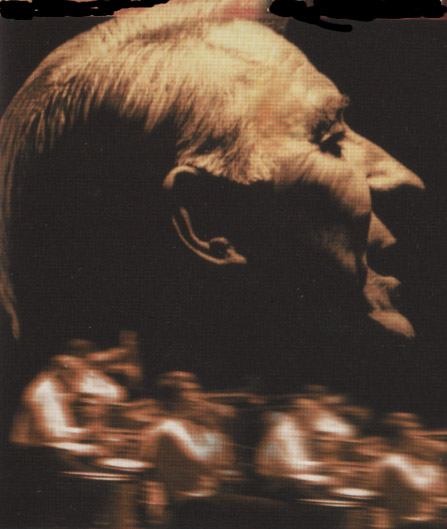 Nothing
was further from the
truth. Small talk bored him. He was not, as many close to him
were aware, an
articulate conversationalist since he hardly ever opened a newspaper or
read a
book. He was interested in only three things; his music, the
Orchestra
and gossip. He
thrived so much on hearing juicy tidbits about people in and out of
show
business we nicknamed the ‘Rona Barrett of the bus'. Nothing
was further from the
truth. Small talk bored him. He was not, as many close to him
were aware, an
articulate conversationalist since he hardly ever opened a newspaper or
read a
book. He was interested in only three things; his music, the
Orchestra
and gossip. He
thrived so much on hearing juicy tidbits about people in and out of
show
business we nicknamed the ‘Rona Barrett of the bus'.
No one had to tell Stan how
the Orchestra sounded. He,
more than anyone, knew what it took to keep the it sounding like a
well-oiled,
precision disciplined machine capable of creating a breathtaking range
of
dazzling
emotions, which was one of the reasons he kept the arrangers busy
expanding the library.
It
was not unusual for us to
leave Los Angeles with a library of 200 scores and return with more
than 350.
Many
of which
were played only once, then relegated to the bottom of the book never
to be
played again.
An exception was Dee Barton’s brooding, brilliant arrangement of ‘Here’s That Rainy Day’ which was used
as the set piece that opened a concert or dance engagement and
was often played twice in a night depending upon Stan’s mood.
On the
road, Stan’s mercurial personality was a study in contrasts. For weeks,
sometimes months, he would be out-going, tolerant of minor missteps
both on the
bus and
bandstand, generous to a fault and take great delight in his role as a
surrogate father to 22 wandering minstrels. He also possessed seemingly
inexhaustible reservoirs of energy belying the fact he had spent over
25 years on the Road.
Then,
like lightning, his temperament would turn dark, brooding and
malevolent. For
no apparent reason he would became mean, sarcastic, petty, unforgiving
and
unreasonable. When this happened everyone gave him a wide berth, both
on the
bus and on the date, because no one wanted to run the risk of having
him ream
them out over some petty transgression. Or, worse yet, decide to
fire them
a thousand miles from home.
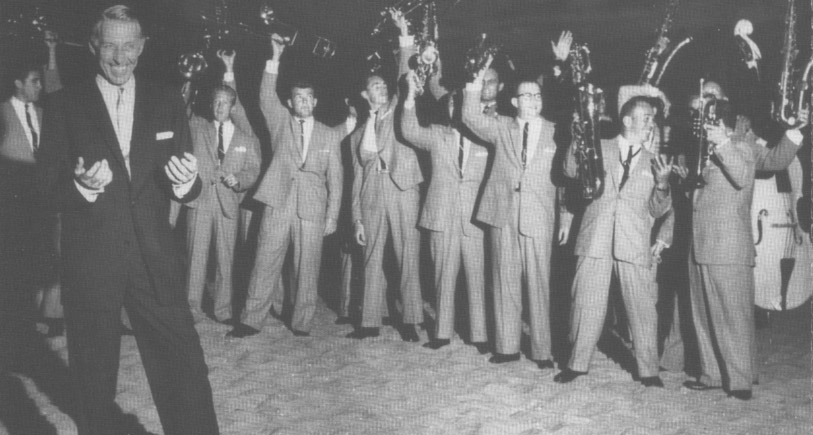
I think
he was acutely aware the Orchestra's temperament was dependent upon his
mood.
That when he was happy everyone was happy. Yet there were times he
could have
cared less if the guys were under real or imagined pressures or going
through a
tumultuous period
in their lives. Being away from home and their girl friends or wives
for months at a time took its toll and could make for some frazzled
personalities. Stan felt the pressure, too, and for days he walked
through the dates like a zombie
unable
to disentangle himself from the many problems that had begun
manifesting at home and on the Road.
Eventually,
the problems at home and the problems on the Road would become so
burdensome
Stan merely went through the motions as our leaderless Orchestra moved
listlessly from
job to
job. The strenuous emotional challenge involved in keeping Stan's home
life
separate from his professional life was compounded by his excessive
drinking.
There
were problems
with his pending divorce from Ann Richards . Problems with the
kids rebelling against school and being left in the care of a less than
competent housekeeper. Problems meeting the payroll. Problems with
Capitol not
promoting his albums . Problems with his career veering off center
because of
inept personal management. Problems with a musician or two who had begun
slacking off and missing cues. Problems with alcohol which were
becoming
ever more
serious as he grew older. Problems with his health. Problems. Problems.
Problems. They never seemed to go away.
For the
most part he was able to keep his professional life separate from his
personal
life. There was the Stanley Kenton (none of his friends or the Band
ever called
him Stan) who lived with his children
in Los Angeles. Then there was the Stan Kenton, who led an orchestra
and
lived 300
days on the Road.
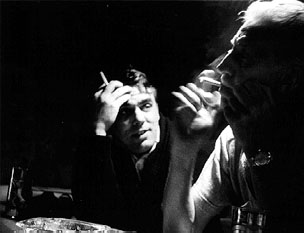 Two vastly dissimilar alter egos which merged together and
often clashed for no apparent reason. The Stanley Kenton who lived at home
was a caring, loving Father devoted to his children, who couldnt wait to
get back out on the Road. Two vastly dissimilar alter egos which merged together and
often clashed for no apparent reason. The Stanley Kenton who lived at home
was a caring, loving Father devoted to his children, who couldnt wait to
get back out on the Road.
The Stan Kenton who spent 10 or more months on the Road and
who was a surrogate father to 22-extraordinarily talented musicians, was
constantly racked with guilt because he wasnt spending more time with his
two young children, Lance and Dana.
Although
he never drank before or on the job, he would begin consuming copious
amounts of alcohol minutes after the final notes of the Band’s theme
drifted
off into the late night and within 40-minutes be totally inebriated.
Yet, In a fit of perversity he often lashed out at the men,
castigating them for drinking too much and working the job with a
roaring hangover.
The men found it bewildering, given his own problems with alcohol, that
he
thought nothing of singling one of them out for a severe
tongue-lashing,
followed by calling him a 'juice head',
a label which usually signaled the guy’s demise on the Band.
During
these times only a true Kenton aficionado might sense a lack
of esprit
de corps and realize something was missing between leader and
Orchestra. To the
trained ear the solo work sounded dull and listless and lacked the
intoxication
one underwent when touched by a brilliant player’s virtuoso
performance. The
ensemble work not only sounded flat and disjointed and had lost its
buoyancy, it
also had lost its ability to move out and across an audience like
sheets of crackling thunder.
Even the Orchestra’s signature, stratospheric trumpet work had lost its
snap
and sounded fractionated. These were not good nights and it amused us
to hear
some sycophant fan gushing to Stan
between sets:
“God,
Stan, the Band sounds fantastic tonight.”
Oddly
enough, most fans had not come to hear the music. Most couldn’t tell a
Kenton
arrangement from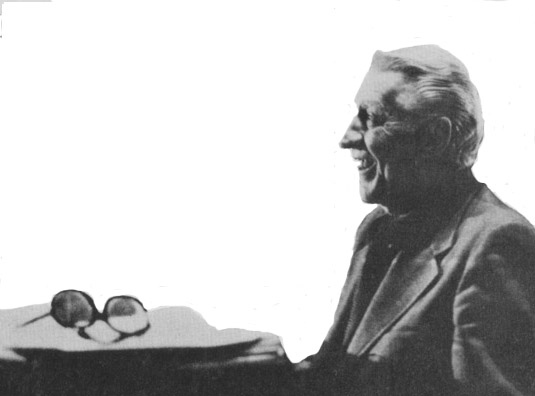 one written by Holman or Richards or Roland. Although
Stan was
fond of describing his music as an “intellectual stimulus for a very
select
audience anxious to expand their musical awareness,” most Kenton fans
were
musical illiterates, incapable of being able to distinguish a quarter
note from a
sixteenth or understanding the difference between minor and major keys.
They
were there to bask in the aura of the Kenton mystique. To reach out and
touch
the mantle of someone, who, through their unfailing support, had been
transformed into a mythical legend. It was not unusual to see someone
tightly
clutching a album cover or ragged piece of paper for him to sign,
approach him
and hyperventilate when he asked their name so he could personalize the
autograph for them. one written by Holman or Richards or Roland. Although
Stan was
fond of describing his music as an “intellectual stimulus for a very
select
audience anxious to expand their musical awareness,” most Kenton fans
were
musical illiterates, incapable of being able to distinguish a quarter
note from a
sixteenth or understanding the difference between minor and major keys.
They
were there to bask in the aura of the Kenton mystique. To reach out and
touch
the mantle of someone, who, through their unfailing support, had been
transformed into a mythical legend. It was not unusual to see someone
tightly
clutching a album cover or ragged piece of paper for him to sign,
approach him
and hyperventilate when he asked their name so he could personalize the
autograph for them.
Eventually
the day would come when Stan began gradually slipping the bonds of
lethargy and
came to grips with his demons before they completely paralyzed him.
Once
this happened he would be the first one on the bus effusively greeting
everyone
by name as they climbed on board,
reaching out and patting them on shoulder as they struggled with their
gear
down the aisle. Even those who had awakened in a foul mood found they
couldn’t
resist his radiant smile and infectious laugh as he made small talk
with those in the front
compartment.
Moments
after the bus was locked down and Eric began moving it into traffic
Stan would
take his command position in the side door well letting everyone know
that once
again he
was off and running, anxious to pull the Orchestra back together again.
We
continually marveled at how his temperament could change from a
borderline android, who had been fumbling his way from one job to the
next, to the
highly-energized, bigger-than-life Road warrior we all loved and
admired. Today
he might well have been diagnosed as a clinical manic depressive who
forced
himself to face the world, relying only on some inner strength to carry
him
forward
until the black cloud of depression that had mysteriously and without
warning enveloped him passed.
Every
group, especially one as large and complex as the Kenton Orchestra,
requires a
captain with
a steady hand to keep it sailing safely through uncharted waters. In
our
case the
long, unpredictable Road. And no one was more aware of this
than Stan,
who knew when and how to bring the Band back from the edge of darkness.
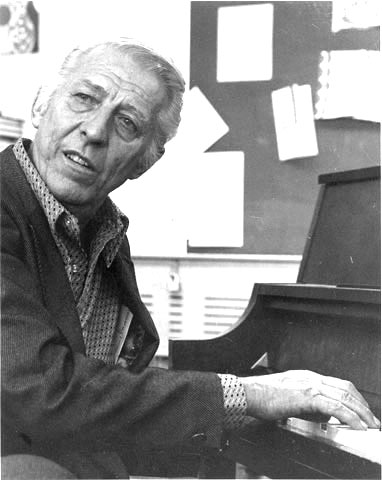 Usually
his ill-humor never lasted more than a day or two. Three at most. One
incident,
however, which lasted not quite a week took all of us to the breaking
point with
his abjection. Usually
his ill-humor never lasted more than a day or two. Three at most. One
incident,
however, which lasted not quite a week took all of us to the breaking
point with
his abjection.
It
happened one night, about an hour out of Memphis,
where we had performed to less than 500 people at a ballroom that had
seen
better days. Tennessee
was
predominantly a country-western culture and none of us ever understood
why our
booking agency accepted play dates anywhere other than Vanderbilt
University and the University
of Tennessee, both of whom thoroughly
enjoyed having the Band perform at
their proms.
Adding to the disappointment of a less than productive date was the
knowledge the county the ballroom was located in was dry. If you wanted a
drink you had to bring your own bottle. The only thing served at the bar
were setups and soft drinks. Once the word was passed that there would be
no booze available the guys began exhibiting all the classic signs of
withdrawal. Dry mouth. Stomach cramps. A slight case of the shakes.
Irritability. They had been counting on being able to get a drink at the
bar during the breaks since we hadnt made a liquor stop in two days.
There wasnt so much as a can of warm beer left on the bus.
The Road
Manager, who was charged with maintaining a weekly schedule of
all the
locations we would be playing at and any problems we might encounter
buying
liquor enroute had blown it. Even Stan, who enjoyed relaxing with a
bottle
of J&B Scotch every night, was put out and asked Eric, our bus
driver, if
he would mind returning to Memphis and picking-up whatever anyone
wanted.
Unfortunately for the one’s who were showing signs of early withdrawal Eric wouldn’t be able to leave until the
instruments were unloaded and the bandstand set up; at
least
another hour. As one might expect the guys began wandering around,
complaining they
wouldn’t be at their best unless they had “a taste to loosen their
tonsils."
They made it quite clear they were not pleased with the Road Manager
and would
have no hesitation about leaving him behind when the dance ended around
1 o’clock.
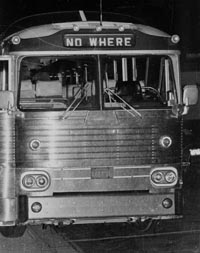 Eric
wasn’t too pleased either with having to drive back to Memphis, find a
liquor
store that was open and locate a place to park a 40-foot bus while he
went in
and picked-up 40 to 45 bottles of liquor. Even a skilled driver like
Eric found
it nerve-wracking to try and maneuver the bus down narrow city streets,
searching for wide enough intersections
in order to negotiate right hand turns without climbing the curb. Everyone
had put in a double order since the next day was Sunday and nothing
within
400 miles would be open until Monday morning. Eric, however, was adept
at
handling assignments of this nature and after 20 years of driving Kenton Orchestras all over the United
States, Canada
and Mexico,
little, if anything, fazed him. Unfortunately the only place to park
was on the
street directly in front of the store. Eric
wasn’t too pleased either with having to drive back to Memphis, find a
liquor
store that was open and locate a place to park a 40-foot bus while he
went in
and picked-up 40 to 45 bottles of liquor. Even a skilled driver like
Eric found
it nerve-wracking to try and maneuver the bus down narrow city streets,
searching for wide enough intersections
in order to negotiate right hand turns without climbing the curb. Everyone
had put in a double order since the next day was Sunday and nothing
within
400 miles would be open until Monday morning. Eric, however, was adept
at
handling assignments of this nature and after 20 years of driving Kenton Orchestras all over the United
States, Canada
and Mexico,
little, if anything, fazed him. Unfortunately the only place to park
was on the
street directly in front of the store.
He hadn’t been gone
5-minutes
when a
squad car, lights flashing, pulled-up and two officers leaped out.
While one of
them stood alongside the bus and began writing a summons the other one,
who was
so obese he hardly fit into his uniform strode majestically into the
store and
asked Eric if that was his bus parked outside and wasn’t he aware it
was
against city regulations to park it on the street? Eric politely
explained to
him he hadn’t seen any signs indicating there was no parking.
“There
aren’t any for cars,” the beefy cop said, taking his campaign-style hat
off and
wiping the perspiration off the inside band with a red checkered
handkerchief.
“The ordinance applies only to buses. Out of town buses!”
Eric,
who had been around the block a few times, knew it was a setup. That
the cops
had seen the California
license
plates and were going to stick it to him.\
“That a
tour bus?” the fat cop asked looking out the window at his fellow
officer.
“No,
it’s a private charter,” Eric quietly answered him.
“Tourists?”
“No, an
orchestra.”
“Orchestra?
Whose?
“Stan
Kenton.”
Never head of him, the c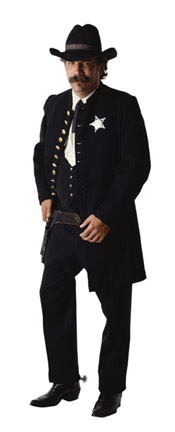 op said taking out a fat plug of tobacco. op said taking out a fat plug of tobacco.
“What if
I move the bus right now? Would I still get a ticket?”
Fraid so. We dont tolerate much people breaking our
laws. Let people do
what they want and all a sudden you got anarchy from one
end of town to the next, can't have that. No siree, bub! the cop said
with a benign smile.
By now
the cop outside had finishing writing out the ticket and walked into
the store
and handed it to with a big smile to Eric.
“You’ll
have to come with us and settle it now,” said the cop ominously as
though Eric
was a wanted felon.
“Can you
tell me how much it will be?” Eric asked, sensing it would be stiff.
“$75.00,
plus $10.00 court costs. Cash only. No checks. We don’t accept
out-of-state
checks!”
Eric
knew he had $225.00, most of which was everyone’s liquor money. After
paying
the fine he’d only have enough to pick-up half the order. Unfortunately
he had
no alternative, knowing full well the cops would impound the bus if he
couldn’t
pay the fine. Thinking quickly he decided to buy as much vodka his
depleted
funds would allow and forego getting any bourbon or Scotch. That
decision
permitted him to add eight more bottles of vodka, bringing the
complement up to
28 fifths. After paying the manager and loading the cases underneath
the bus so
they wouldn’t have an excuse to stop him on the outskirts of town for
having
liquor inside a motor vehicle he rode over to the station house with
the two
officers and paid the ticket.
Before
leaving he politely asked the cops for a ride back to the bus.
“Sorry,”
the beefy one said. “We can’t be chauffeuring people around this time
of night.
We’ve got to make rounds,” he said, swinging his rutabaga-shaped body
into the
squad car as they sped off into the night laughing.
Eric
took his time walking the 10 blocks back to where the bus was parked
since he
was in no great rush to explain to Stan and the guys that half the
money they
had entrusted to him had gone to pay a parking fine. He knew they
wouldn’t give
a damn about the money. It was the thought of having to stretch the
liquor out
for two days before another run could be made that was going to
cause
all sorts of problems. Maybe, once they crossed over into the mountains
tomorrow at noon they could
pick-up
some moonshine. A ghastly, but workable idea, which would appeal to
only the most
die-hard drinkers.
As he
pulled back into the ballroom parking lot he could see several guys standing
around the side door acting as lookouts so they could alert the rest of
the
Band he had returned. They were still on break so a number of
them rushed over and
waited expectantly for Eric to open-up the swing-away luggage doors.
standing
around the side door acting as lookouts so they could alert the rest of
the
Band he had returned. They were still on break so a number of
them rushed over and
waited expectantly for Eric to open-up the swing-away luggage doors.
After
explaining to them what happened and how he had to flush the initial
liquor
order out with extra vodka he went to find Stan, who was arguing with
the
promoter who wanted to cut the Band’s performance fee since only 500
people had
come out to the date. The ballroom owner claimed he had expected at
least
2000 people
to show up to hear the Band, which was an out-and-out lie since there
probably
weren’t more than 1200 people within a 50-mile radius of the
ballroom.
After
listening
to the owner moan, groan, belly-ache and wring his hands about how much
this
date had cost him in added security, parking attendants and advertising
because
“an attraction as famous as the Stan Kenton Orchestra was appearing at
his
ballroom,” none of which was true, Stan agreed to accept $500.00 less
than the
contract stipulated.
Thinking
the guy would be delighted he had managed to filch the Band out of
$500.00, Stan
got up
to see what Eric wanted. Before he had taken three steps the guy yelled
after
him, “Make it seven-fifty and we got a deal.”
Make it five hundred and well play out the night, Stan
told him, rigid with rage that we had been booked into a date from hell.,
otherwise were leaving.
“You’ll
take the seven fifty and
finish
playing or I’ll sue you for breach of contract,” the owner yelled back.
“Up
yours!” an infuriated Kenton told him. “We’ll finish, but you’ll hear
from
Associated Booking’s attorneys.”
He then
walked over to Eric and asked him what was up. Eric explained what had
happened with the police, which
made him
even more tearass.
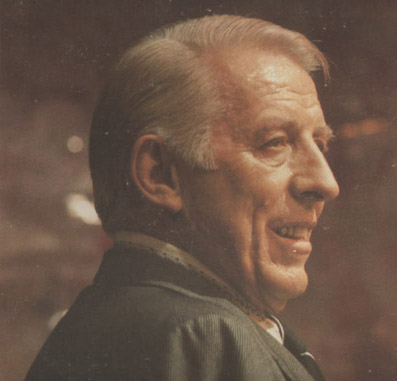 The
Band
had the last word, however. The
Band
had the last word, however.
They
played the remaining hour and a half,
improvising arrangements done in the style of Lawrence Welk, Blue Barron, Sammy
Kaye and Freddy Martin. It didnt take long before the ballroom began
emptying out as one irate couple after another told the owner they had
come to listen to the progressive sounds of Stan Kenton not swing & sway
music. After demanding their money back they made it clear they would
never return.
There
was nothing the owner could do. Stan had honored the contract to the
full
letter of the law so he had to be paid, although it meant he was
forced to
accept seven hundred and fifty dollars less than what had been agreed
upon. Such was life on the 'Big Bad Band from Hollywood, California.'
A
week later Associated Booking Corporation went to court and secured a
judgment against the owner in the amount of $2500.00
for violating the contract.
Hearing that good news the Band continued on its merry way to the East
Coast, where they were booked into 'Basin Street East' for three
glorious weeks with Oscar Peterson and Chris Connor.
It was, for
the 1961 Stan Kenton Orchestra, the date of dates!
|